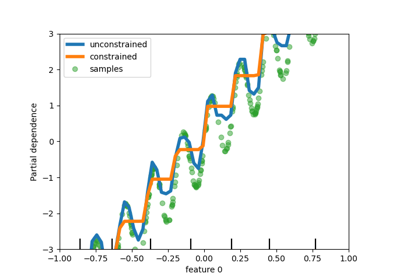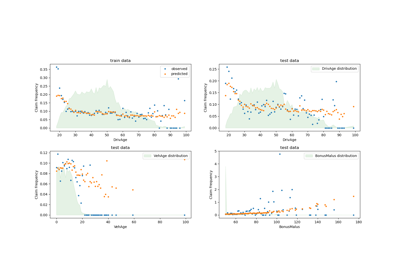sklearn.linear_model.GammaRegressor¶
-
class
sklearn.linear_model.GammaRegressor(*, alpha=1.0, fit_intercept=True, max_iter=100, tol=0.0001, warm_start=False, verbose=0)[source]¶ Generalized Linear Model with a Gamma distribution.
Read more in the User Guide.
- Parameters
- alphafloat, default=1
Constant that multiplies the penalty term and thus determines the regularization strength.
alpha = 0is equivalent to unpenalized GLMs. In this case, the design matrixXmust have full column rank (no collinearities).- fit_interceptbool, default=True
Specifies if a constant (a.k.a. bias or intercept) should be added to the linear predictor (X @ coef + intercept).
- max_iterint, default=100
The maximal number of iterations for the solver.
- tolfloat, default=1e-4
Stopping criterion. For the lbfgs solver, the iteration will stop when
max{|g_j|, j = 1, ..., d} <= tolwhereg_jis the j-th component of the gradient (derivative) of the objective function.- warm_startbool, default=False
If set to
True, reuse the solution of the previous call tofitas initialization forcoef_andintercept_.- verboseint, default=0
For the lbfgs solver set verbose to any positive number for verbosity.
- Attributes
- coef_array of shape (n_features,)
Estimated coefficients for the linear predictor (
X * coef_ + intercept_) in the GLM.- intercept_float
Intercept (a.k.a. bias) added to linear predictor.
- n_iter_int
Actual number of iterations used in the solver.
Methods
fit(X, y[, sample_weight])Fit a Generalized Linear Model.
get_params([deep])Get parameters for this estimator.
predict(X)Predict using GLM with feature matrix X.
score(X, y[, sample_weight])Compute D^2, the percentage of deviance explained.
set_params(**params)Set the parameters of this estimator.
-
__init__(*, alpha=1.0, fit_intercept=True, max_iter=100, tol=0.0001, warm_start=False, verbose=0)[source]¶ Initialize self. See help(type(self)) for accurate signature.
-
fit(X, y, sample_weight=None)[source]¶ Fit a Generalized Linear Model.
- Parameters
- X{array-like, sparse matrix} of shape (n_samples, n_features)
Training data.
- yarray-like of shape (n_samples,)
Target values.
- sample_weightarray-like of shape (n_samples,), default=None
Sample weights.
- Returns
- selfreturns an instance of self.
-
get_params(deep=True)[source]¶ Get parameters for this estimator.
- Parameters
- deepbool, default=True
If True, will return the parameters for this estimator and contained subobjects that are estimators.
- Returns
- paramsmapping of string to any
Parameter names mapped to their values.
-
predict(X)[source]¶ Predict using GLM with feature matrix X.
- Parameters
- X{array-like, sparse matrix} of shape (n_samples, n_features)
Samples.
- Returns
- y_predarray of shape (n_samples,)
Returns predicted values.
-
score(X, y, sample_weight=None)[source]¶ Compute D^2, the percentage of deviance explained.
D^2 is a generalization of the coefficient of determination R^2. R^2 uses squared error and D^2 deviance. Note that those two are equal for
family='normal'.D^2 is defined as \(D^2 = 1-\frac{D(y_{true},y_{pred})}{D_{null}}\), \(D_{null}\) is the null deviance, i.e. the deviance of a model with intercept alone, which corresponds to \(y_{pred} = \bar{y}\). The mean \(\bar{y}\) is averaged by sample_weight. Best possible score is 1.0 and it can be negative (because the model can be arbitrarily worse).
- Parameters
- X{array-like, sparse matrix} of shape (n_samples, n_features)
Test samples.
- yarray-like of shape (n_samples,)
True values of target.
- sample_weightarray-like of shape (n_samples,), default=None
Sample weights.
- Returns
- scorefloat
D^2 of self.predict(X) w.r.t. y.
-
set_params(**params)[source]¶ Set the parameters of this estimator.
The method works on simple estimators as well as on nested objects (such as pipelines). The latter have parameters of the form
<component>__<parameter>so that it’s possible to update each component of a nested object.- Parameters
- **paramsdict
Estimator parameters.
- Returns
- selfobject
Estimator instance.


